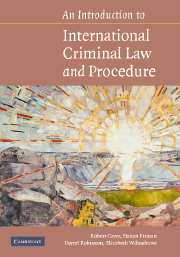Book contents
- Frontmatter
- Contents
- Preface
- Table of Cases
- Table of Treaties
- Table of Abbreviations
- Part A Introduction
- Part B Prosecutions in National Courts
- Part C International Prosecutions
- Part D Substantive Law of International Crimes
- Part E Principles and Procedures of International Prosecutions
- Part F Relationship Between National and International Systems
- Index
Preface
- Frontmatter
- Contents
- Preface
- Table of Cases
- Table of Treaties
- Table of Abbreviations
- Part A Introduction
- Part B Prosecutions in National Courts
- Part C International Prosecutions
- Part D Substantive Law of International Crimes
- Part E Principles and Procedures of International Prosecutions
- Part F Relationship Between National and International Systems
- Index
Summary
With the start of the first prosecutions by the International Criminal Court and the closing phases of the work of the ad hoc Tribunals, this is a good time for a new book on international criminal law and its institutions. This book is intended as an accessible yet challenging explanation and appraisal of international criminal law and procedure for students, academics and practitioners. We focus on the crimes which are within the jurisdiction of international courts or tribunals – genocide, crimes against humanity, war crimes and aggression – and the means of prosecuting them. We also briefly discuss terrorist offences, torture, and other crimes which are not (yet) within the jurisdiction of an international court or tribunal.
International criminal law is now a vast subject, even on our circumscribed view of what it contains. This book is intended as a manageable and useful introduction to the field, and therefore does not attempt to delve into the entirety of the subject in the full detail it deserves. We welcome comments on possible improvements that could be made. We have sought to be succinct rather than simplistic in our presentation. We have included some references to academic commentary, both in the footnotes and in ‘further reading’ sections at the end of each chapter. However, there is a great deal of writing on international criminal law, and we could not refer to it all.
- Type
- Chapter
- Information
- An Introduction to International Criminal Law and Procedure , pp. xi - xiiiPublisher: Cambridge University PressPrint publication year: 2007
- 1
- Cited by



